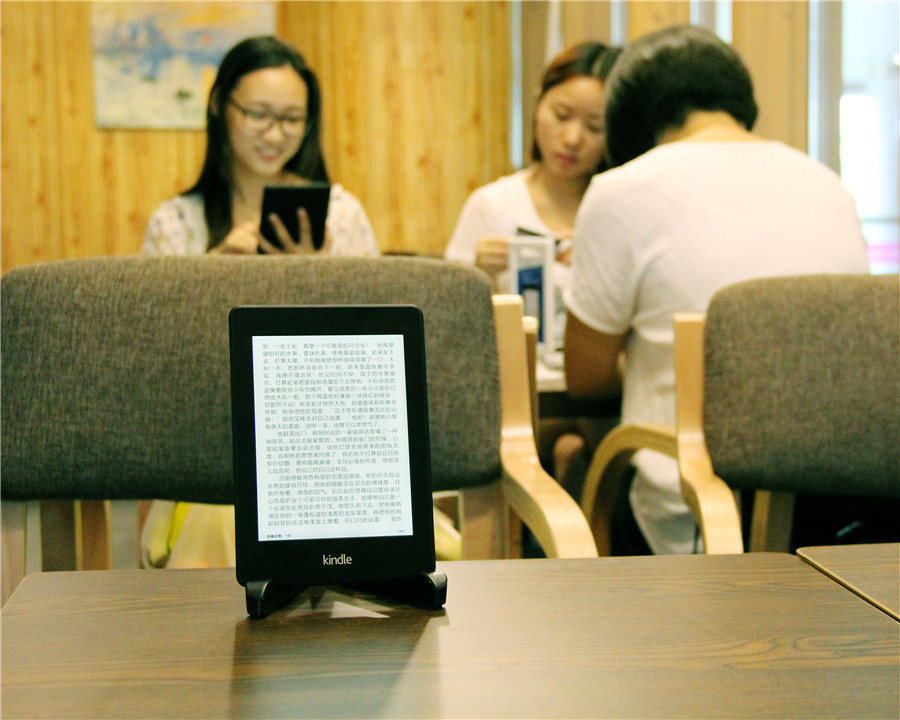Bridging the reading gap in China


Consumer spend on high-quality and paid digital content witnesses steady growth
Zhang Zixuan, 27, a middle school teacher in Beijing, loves reading romantic books on her mobile phone app - WeChat Read. She has downloaded 15 books, and usually reads for one hour each day through the app.
"It is convenient for me to use in my spare time. I also listen to audio books through Ximalaya, a popular audio sharing platform, before I go to sleep, and spend money on programs I like," said Zhang, adding that she has paid 208 yuan ($29.5) for a one-year membership fee for the platform.
Zhang is among the millions of Chinese citizens who are willing to pay for online publications. With the improvement of copyright protection awareness in China, the number of people who spend money on digital paid content such as audio, video, social networking, live broadcasting, games and music, has been increasing every year.
China's digital reading market hit 25.45 billion yuan last year, up 19.6 percent year-on-year, with the number of Chinese citizens who read digital publications rising to 432 million, according to a report by the China Audio-Video and Digital Publishing Association.
The report said an average of 12.4 digital publications were read per person in 2018, with each person spending an average of 71.3 minutes on each read. About 66.4 percent of the readers said they were willing to pay for online publications, and nearly 70 percent confirmed that the content quality has improved.
Moreover, people aged between 14 and 18 spent more time on e-reading overall, while those aged between 25 and 30 read an average of 13.22 digital publications last year, higher than the average figure.
China Literature Ltd, a leading online literature platform in the country, is ramping up its efforts in online paid reading services, as reading via mobile phone apps has become one of the most important channels for people to gain information.
"The content offered to readers for free is often of low quality, while the paid services concentrate on high-quality content. Currently, the free reading and paid reading continue to exist side by side," said Wu Wenhui, co-CEO of China Literature.
Wu said there are still some pirate websites in the market, which earn advertising revenue by providing free reading services, although some websites have increased the purchase of copyrights since last year.
China Literature, which has Tencent as its shareholder and strategic partner, distributes its content via the mobile QQ app, QQ browser, WeChat Reading, Tencent News and Tencent Video.
The company monetizes its vast and proprietary content library through online paid reading and content adaptations for a variety of entertainment formats. Its diverse and high-quality content library is a significant competitive advantage that lies at the core of its business model, according to Wu.
According to China Literature, more than 70 percent of mobile digital readers are aged below 26, with the post-90s generation accounting for 42 percent. Among the paid users, the post-90s account for 43 percent, with an average annual payment of 80 yuan, which is much higher than other age groups.
Wu explained that compared with the post-80s generation, the post-90s generation has more leisure time and greater demand for mobile reading apps and content. He believes that the post-90s generation, who grew up in a relatively relaxing material and spiritual environment, have two major consumption capacities.
"They have immediate consumption capacity, and great potential to become the core consumer group who favor paid reading services in the future."
As of Dec 31, 2018, the company had 7.7 million writers and 11.2 million online literary works, covering over 200 genres and reaching millions of readers.
"At present, more and more white-collar workers, college students and other young groups pay more attention to personal development under the existing material conditions, so they have greater willingness to pay for what they read and accept such kind of consumption patterns," said Huang Guofeng, an analyst at Beijing-based internet consultancy Analysys.
Huang said the paid reading model should be based on user demand and application scenarios. "As the same content can't meet the needs of all people, we must differentiate the targeted readers."
Liu Xin, general manager of Migu Co Ltd, China Mobile's entertainment content subsidiary, said with advantages of low latency, high reliability and wide bandwidth, technologies like 5G will bring about unprecedented opportunities for the digital reading industry and enhance readers' reading experience.
Liu said the combination of 5G wireless technology with big data, cloud computing, artificial intelligence and the internet of things will expand the application space and scenarios of digital reading.
"The integration of digital reading with virtual reality, augmented reality, games, audio and video will allow reading to become more vivid and offer readers an immersive experience."




































